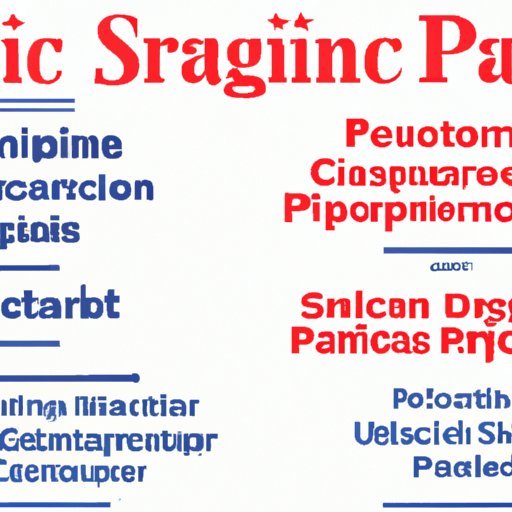Introduction
Political campaigns require large amounts of money to be successful. In order to run a successful campaign, candidates must secure funding from various sources. This article will explore the various sources of political campaign financing and analyze the potential benefits and risks associated with them.

Definition of Political Campaign Financing
Political campaign financing is the process of raising funds for a political campaign. Funds may come from individuals, organizations, or other entities that support the candidate’s policy positions. The funds are used to pay for campaign activities such as advertising, travel expenses, staff salaries, and more.
Overview of the Problem
Political campaigns are expensive endeavors. Candidates need to raise large amounts of money to finance their campaigns. Unfortunately, this often leads to corruption, as candidates seek out money from wealthy donors, special interest groups, and other sources that may not have the public’s best interests in mind.
Analyzing the Sources of Political Campaign Financing
Overview of Donations from Private Individuals
Individuals can make direct donations to political campaigns. In the United States, individuals are limited to donating $2,800 per election cycle to a single candidate. These donations must be reported to the Federal Election Commission (FEC). According to a 2018 study by the Center for Responsive Politics, individuals accounted for 64 percent of all contributions to political campaigns in the 2016 election cycle.
Exploring the Role of Super PACs
Super PACs are political action committees that can raise unlimited amounts of money from individuals, corporations, labor unions, and other organizations. Unlike traditional political action committees, Super PACs are not subject to the same restrictions on contributions and expenditures. According to a 2017 report from the Center for Responsive Politics, Super PACs accounted for 19 percent of all contributions to political campaigns in the 2016 election cycle.
Investigating the Influence of Lobbyists and Special Interest Groups
Lobbyists and special interest groups can also have a significant influence on political campaigns. Lobbyists are hired by corporations, labor unions, and other organizations to influence public policy. They often donate large sums of money to political campaigns in exchange for access and influence. According to a 2018 report from the Center for Responsive Politics, lobbying organizations and special interest groups accounted for 17 percent of all contributions to political campaigns in the 2016 election cycle.
Understanding the Role of Small Donors
Small donors, or individuals who give less than $200 to a political campaign, can also have an impact on elections. Small donors often represent the grassroots supporters of a campaign and can provide a great deal of support to a candidate’s efforts. According to a 2018 study by the Center for Responsive Politics, small donors accounted for only 1 percent of all contributions to political campaigns in the 2016 election cycle.

Examining the Impact of Dark Money on Political Campaigns
Definition of Dark Money
Dark money is money that is donated to political campaigns without having to disclose the identity of the donor. This type of money has been used to finance political campaigns for decades, but its use has grown significantly in recent years. According to a 2018 report from the Center for Responsive Politics, dark money accounted for 12 percent of all contributions to political campaigns in the 2016 election cycle.
How Dark Money Influences Political Campaigns
Dark money can have a significant influence on political campaigns. By not having to disclose the identity of the donor, dark money allows individuals and organizations to secretly funnel large amounts of money into political campaigns without anyone knowing who is providing the money. This can lead to corruption as wealthy donors can use their money to influence elections without having to answer to anyone.
Potential Consequences of Dark Money in Politics
The use of dark money can have serious consequences for the integrity of elections. Without knowing who is providing the money, it is impossible to know if the money is being used to further a particular agenda or to buy influence with a candidate. It also makes it difficult to regulate how much money is being spent on political campaigns, as the sources of the money are hidden.

Exploring the Role of Super PACs in Political Campaigns
Definition of Super PACs
Super PACs are political action committees that can raise unlimited amounts of money from individuals, corporations, labor unions, and other organizations. Unlike traditional political action committees, Super PACs are not subject to the same restrictions on contributions and expenditures.
How Super PACs Affect Political Campaigns
Super PACs can have a significant influence on political campaigns. Since they are not subject to the same restrictions as traditional PACs, they can raise and spend unlimited amounts of money on behalf of a candidate. This can give Super PACs tremendous power to shape the outcome of an election.
Potential Benefits and Risks of Super PACs
The use of Super PACs can have both positive and negative effects on political campaigns. On the one hand, Super PACs can allow candidates to raise and spend large amounts of money, which can help them win elections. On the other hand, the influence of Super PACs can lead to corruption, as wealthy donors can use their money to influence elections without having to answer to anyone.

Investigating the Influence of Lobbyists and Special Interest Groups
Definition of Lobbyists and Special Interest Groups
Lobbyists are individuals or organizations that are hired by corporations, labor unions, and other organizations to influence public policy. They often donate large sums of money to political campaigns in exchange for access and influence. Special interest groups are organizations that pursue certain political goals. They often donate large sums of money to political campaigns in order to advance their agendas.
How Lobbyists and Special Interest Groups Influence Political Campaigns
Lobbyists and special interest groups can have a significant influence on political campaigns. They often donate large sums of money to political campaigns in exchange for access and influence. This can lead to corruption, as wealthy donors can use their money to influence elections without having to answer to anyone.
Potential Benefits and Risks of Lobbyists and Special Interest Groups
The use of lobbyists and special interest groups can have both positive and negative effects on political campaigns. On the one hand, they can provide candidates with access to large amounts of money, which can help them win elections. On the other hand, the influence of lobbyists and special interest groups can lead to corruption, as wealthy donors can use their money to influence elections without having to answer to anyone.
Understanding the Role of Small Donors in Political Campaigns
Definition of Small Donors
Small donors are individuals who give less than $200 to a political campaign. These donations are not subject to the same restrictions as larger donations, and they often represent the grassroots supporters of a campaign.
How Small Donors Influence Political Campaigns
Small donors can have an important influence on political campaigns. They often provide crucial financial support to campaigns and can help to mobilize grassroots support. Additionally, small donations are not subject to the same restrictions as larger donations, allowing candidates to fundraise from a wider range of people.
Potential Benefits and Risks of Small Donors
The use of small donors can have both positive and negative effects on political campaigns. On the one hand, small donors can provide candidates with access to large amounts of money, which can help them win elections. On the other hand, small donors can be easily influenced by outside forces, which can lead to corruption.
Examining the Effects of Fundraising Strategies on Political Campaigns
Overview of Different Types of Fundraising Strategies
Political campaigns often employ different types of fundraising strategies in order to maximize their fundraising efforts. These strategies can include soliciting donations from private individuals, leveraging the influence of lobbyists and special interest groups, utilizing Super PACs, and more.
How Fundraising Strategies Affect Political Campaigns
Fundraising strategies can have a significant influence on political campaigns. Different strategies can result in different amounts of money being raised, which can have a major impact on a candidate’s chances of success. Additionally, different fundraising strategies can result in different sources of money, which can also affect the outcome of an election.
Potential Benefits and Risks of Different Fundraising Strategies
The use of different fundraising strategies can have both positive and negative effects on political campaigns. On the one hand, different strategies can result in more money being raised, which can help candidates win elections. On the other hand, different strategies can result in different sources of money, which can lead to corruption and other problems.
Conclusion
Summary of Findings
This article explored the various sources of political campaign financing and analyzed the potential benefits and risks associated with them. It found that individuals, Super PACs, lobbyists and special interest groups, dark money, and small donors all play a role in political campaign financing. Additionally, it showed that different fundraising strategies can have a significant influence on political campaigns.
Recommendations for Solving the Problem
In order to reduce the influence of money in politics, it is important to increase transparency and accountability. This can be done by requiring candidates to disclose the sources of their funding and by strengthening regulations on political donations. Additionally, it is important to support small donors in order to ensure that elections are fair and democratic.
(Note: Is this article not meeting your expectations? Do you have knowledge or insights to share? Unlock new opportunities and expand your reach by joining our authors team. Click Registration to join us and share your expertise with our readers.)
